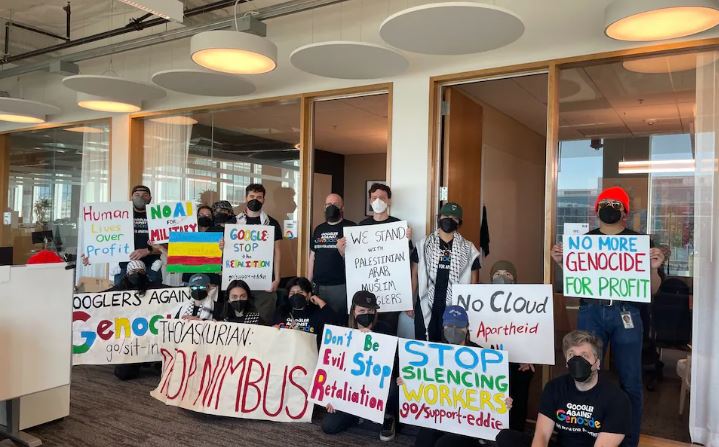
A sit-down protest staged on Tuesday by the activist group “No Tech for Apartheid” led to the termination of 28 employees by Google, as confirmed by a spokesperson for the tech giant on Thursday.
The demonstration targeted Google’s involvement in “Project Nimbus,” a $1.2 billion joint venture with Amazon aimed at providing cloud services to the Israeli government. Organized by “No Tech for Apartheid,” the protest reflected longstanding opposition to this contract.
Video footage captured police arresting Google workers within the premises of Google Cloud CEO Thomas Kurian’s office in Sunnyvale, California. The advocacy group, formerly known as Twitter’s X, reported on the incident.
According to the group, Kurian’s office remained occupied for a duration of 10 hours during the protest.
Employees displayed signs bearing messages such as “Googlers against Genocide,” alluding to allegations concerning Israel’s actions in Gaza.
The activist group “No Tech for Apartheid” organized protests not only in Sunnyvale but also in New York and Seattle. They referenced an April 12 Time magazine article revealing a draft contract wherein Google billed the Israeli Ministry of Defense over $1 million for consulting services.
READ ALSO: We’ll Continue to Support Israel—US
A “small number” of employees “disrupted” a few Google locations, but the protests are “part of a longstanding campaign by a group of organizations and people who largely don’t work at Google,” a Google spokesperson said.
“After refusing multiple requests to leave the premises, law enforcement was engaged to remove them to ensure office safety,” the Google spokesperson said. “We have so far concluded individual investigations that resulted in the termination of employment for 28 employees, and will continue to investigate and take action as needed.”
Israel is one of “numerous” governments for which Google provides cloud computing services, the Google spokesperson said.
“This work is not directed at highly sensitive, classified, or military workloads relevant to weapons or intelligence services,” the Google spokesperson said.
AFP









Leave a Reply